人教版(2019)必修第一册Unit 2 Travelling Around Discovering Useful Structures 课件(共35张PPT)
文档属性
| 名称 | 人教版(2019)必修第一册Unit 2 Travelling Around Discovering Useful Structures 课件(共35张PPT) | 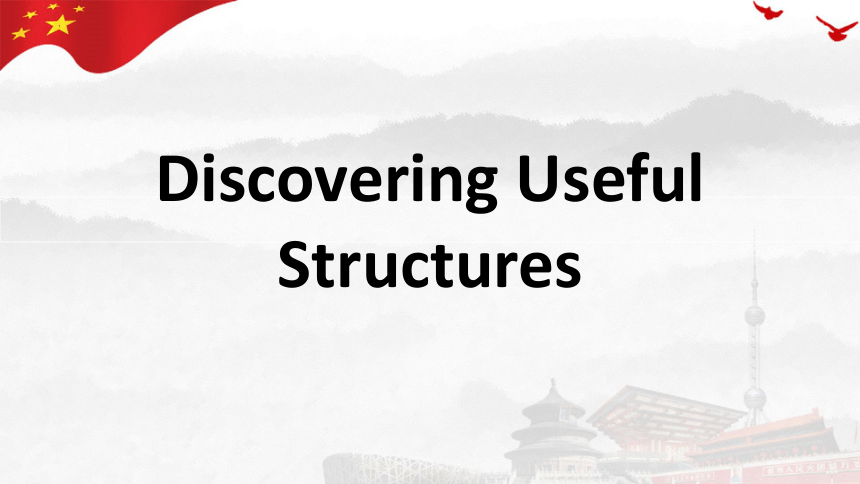 | |
| 格式 | pptx | ||
| 文件大小 | 1.8MB | ||
| 资源类型 | 教案 | ||
| 版本资源 | 人教版(2019) | ||
| 科目 | 英语 | ||
| 更新时间 | 2024-07-23 22:01:23 | ||
图片预览

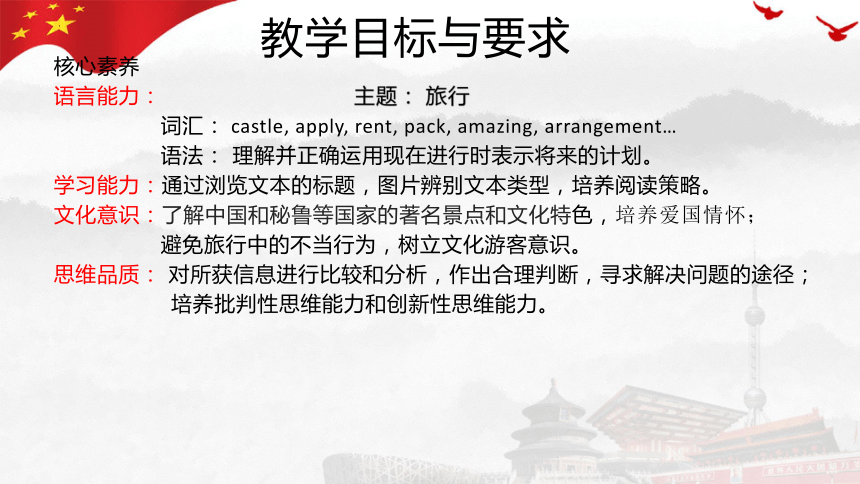
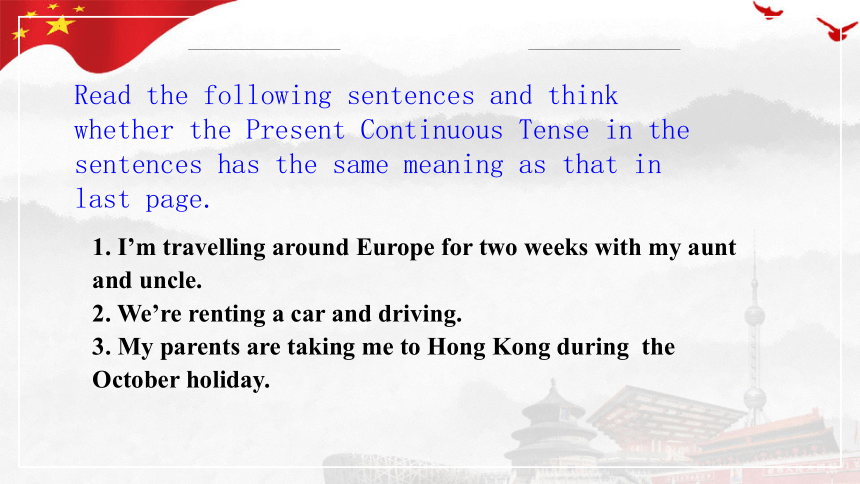
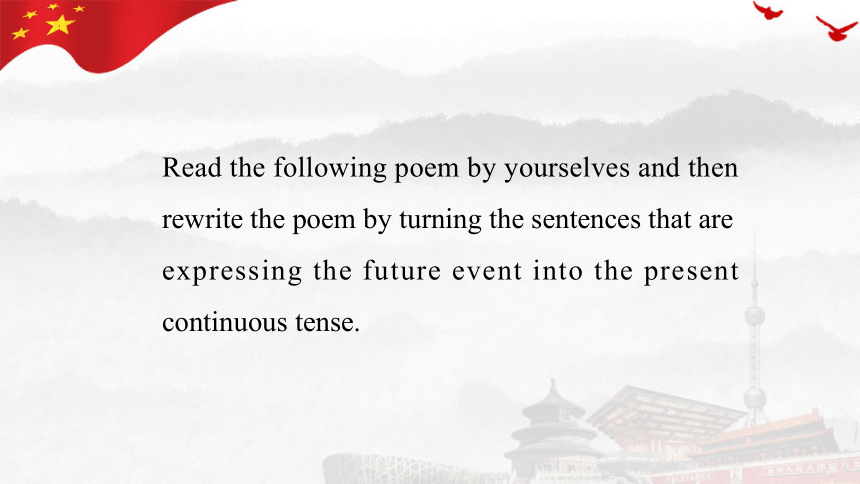
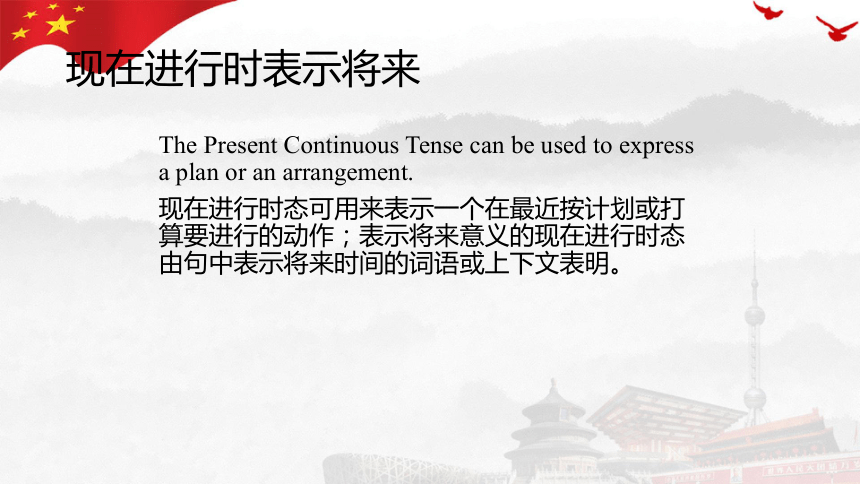
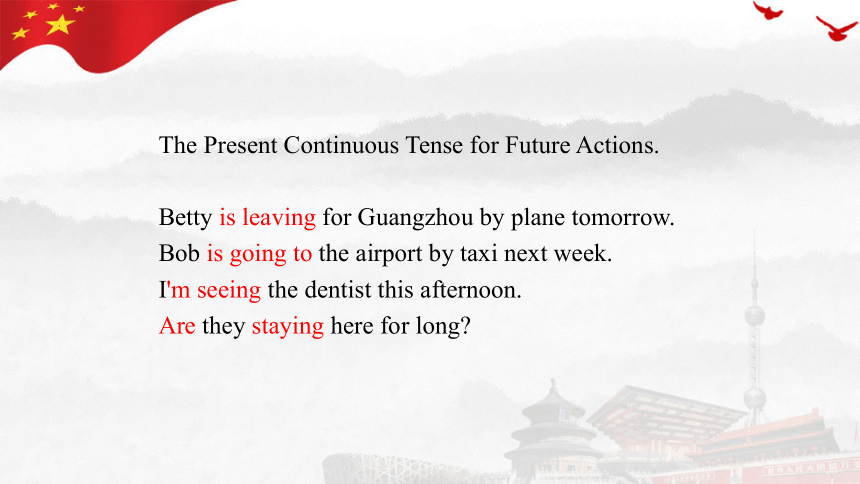
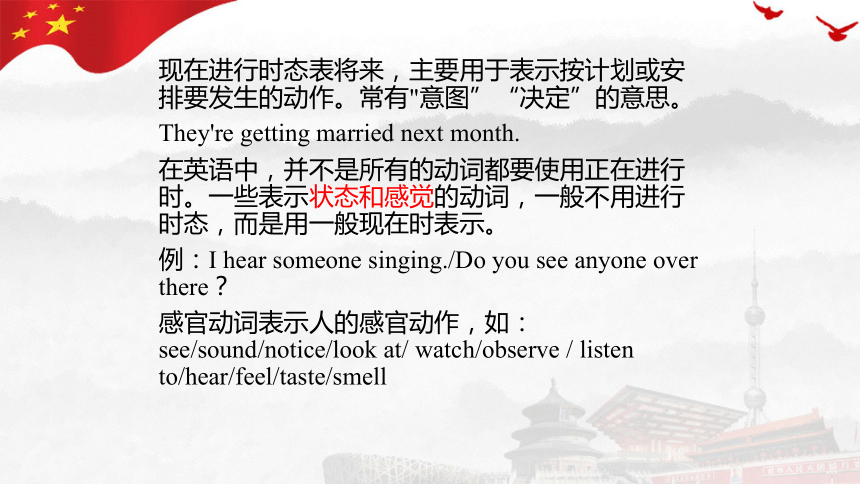
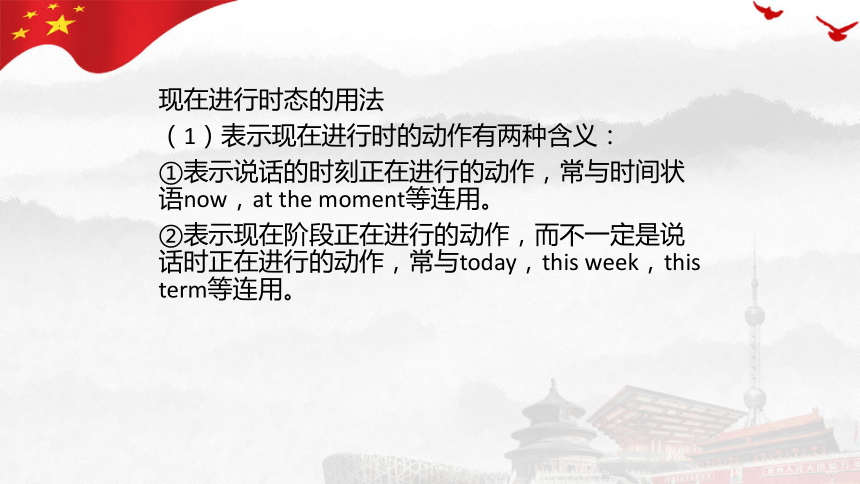

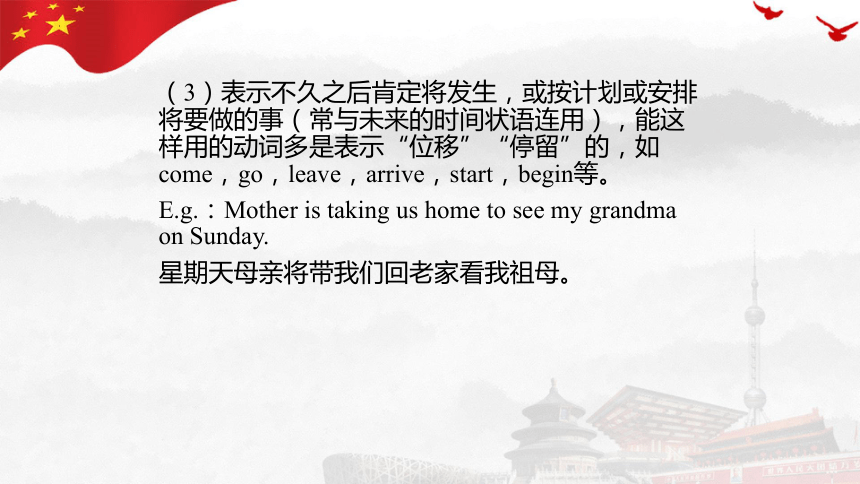


文档简介
(共35张PPT)
Discovering Useful Structures
教学目标与要求
核心素养
语言能力: 主题: 旅行
词汇: castle, apply, rent, pack, amazing, arrangement…
语法: 理解并正确运用现在进行时表示将来的计划。
学习能力:通过浏览文本的标题,图片辨别文本类型,培养阅读策略。
文化意识:了解中国和秘鲁等国家的著名景点和文化特色,培养爱国情怀;
避免旅行中的不当行为,树立文化游客意识。
思维品质: 对所获信息进行比较和分析,作出合理判断,寻求解决问题的途径;
培养批判性思维能力和创新性思维能力。
Read the following sentences and think whether the Present Continuous Tense in the sentences has the same meaning as that in last page.
1. I’m travelling around Europe for two weeks with my aunt and uncle.
2. We’re renting a car and driving.
3. My parents are taking me to Hong Kong during the October holiday.
Read the following poem by yourselves and then rewrite the poem by turning the sentences that are expressing the future event into the present continuous tense.
现在进行时表示将来
The Present Continuous Tense can be used to express a plan or an arrangement.
现在进行时态可用来表示一个在最近按计划或打算要进行的动作;表示将来意义的现在进行时态由句中表示将来时间的词语或上下文表明。
The Present Continuous Tense for Future Actions.
Betty is leaving for Guangzhou by plane tomorrow.
Bob is going to the airport by taxi next week.
I'm seeing the dentist this afternoon.
Are they staying here for long
现在进行时态表将来,主要用于表示按计划或安排要发生的动作。常有"意图”“决定”的意思。
They're getting married next month.
在英语中,并不是所有的动词都要使用正在进行时。一些表示状态和感觉的动词,一般不用进行时态,而是用一般现在时表示。
例:I hear someone singing./Do you see anyone over there?
感官动词表示人的感官动作,如:see/sound/notice/look at/ watch/observe / listen to/hear/feel/taste/smell
现在进行时态的用法
(1)表示现在进行时的动作有两种含义:
①表示说话的时刻正在进行的动作,常与时间状语now,at the moment等连用。
②表示现在阶段正在进行的动作,而不一定是说话时正在进行的动作,常与today,this week,this term等连用。
(2)现在进行时代替一般现在时,表示反复性或习惯性的动作,常与副词always,continually,forever,constantly等连用,表示说话人的赞扬,厌恶,不满,遗憾等的感彩。
①He is always thinking others. 赞扬
②You are constantly complaining. 抱怨
③He is always talking big. 厌烦
④How are you feeling today? 亲切
(3)表示不久之后肯定将发生,或按计划或安排将要做的事(常与未来的时间状语连用),能这样用的动词多是表示“位移”“停留”的,如come,go,leave,arrive,start,begin等。
E.g.:Mother is taking us home to see my grandma on Sunday.
星期天母亲将带我们回老家看我祖母。
将来动作的其他表达方法
will/ shall do
表示将来时间时,一般要与表示将来的时间状语连用,或通过一定的上下文来体现将来时间状语。shall只用于第一人称,will可以通用于各种人称。在问句中shall常用于第一人称表示建议或征求对方意见。
be going to do
A.这种结构表示主体现在的意图,即打算在最近或将来要做某事,主语通常指人。在被动句中,主语可以是物,但动作的执行者当然仍是人。
B.表示有迹象表明将要发生某种情况,一般指客观事态的发展,而不是表示主观的意图。句中的主语可以指人,也可指物,或者非人称代词it。
E.g.:—What are you going to do tonight?
—I'm going to watch the football match on TV.
Look!It's going to rain.
be about to do
这种结构表示“最近或马上要发生的动作”。
例如:
(1) The meeting be about to begin .
会议马上开始。
(2)Summer harvest be about to start .
夏收即将开始。
be to do
这种结构着重指按计划或安排将要发生某事。
A.常见于报纸、广播等,用以宣布官方的计划或决定,如:
B. 一般是指受人指示、制约的动作,它有命令、禁止或可能性的含义,如:
a:You are to stand here. Do you understand
b: Tell her she’s not to be back late.
c: The dictionary is not to be had here.
比较下面两句话:
I am going to finish the work this afternoon.我打算今天下午完成工作。(表示现在意图)
I am to finish the work this afternoon.我应该今天下午完成工作。(表示计划、安排或受人指示)
注:be to do 与be doing都可表示按计划、安排将要发生的事,这两种结构常常可以互换,但be to do常用于正式语体。
一般现在时表示将来
A.由“if , when , as soon as , until , till , after , before”等引导的条件或时间状语从句中,通常用一般现在时表将来。例如:
If she comes, I’ll tell her all about it.
如果她来了,我就会告诉她。
B.表示按照时间表或既定日程一定会发生的将来事态。例如:
A. I’m free this afternoon.
我今天下午有空。
B. School starts on September 1.
学校9月1日开学。
C. The train leaves at 7:30 this evening.
火车今晚7:30开。
D. If you use your head, you’ll have a good idea.
如果你动动脑筋,就会想出好办法。
be going to和will的区别:be going to表示说话人经过事先考虑的想法或有迹象表明某事将要发生;will表示说话人临时决定做的事情或说话人主观认为某事会发生。
I'm going to pick him up at the railway station this afternoon.
今天下午我要去火车站接他。(已经考虑过了)
-This is a very heavy box. 这个箱子很重。
-I'll help you carry it. 我来帮你搬。(临时作出的决定)
语法解析: 将来时
1. will/ shall do
表示将来时间时,一般要与表示将来的时间状语连用,或通过一定的上下文来体现将来时间状语。
(注意:shall只用于第一人称,will可以通用于各种人称。在问句中shall常用于第一人称表示建议或征求对方意见。)
练习:—Do you know when Mary _________(come) back
—At 3 o’clock, I think.
will come
现在进行时
现在进行时是英语的一种时态,表示现在进行的动作或存在的状态。现在进行时表示动作发生的时间是“现在“,动作目前的状态是“正在进行中”。
the present continous tense
现在进行时用法归纳:
(1) 表示现在进行时的动作, 有两种含义:
①表示说话的时刻正在进行的动作,常与时间状语now, at the moment等连用。
②表示现在阶段正在进行的动作,而不一定是说话时正在进行的动作,常与today, this week, this term等连用。
现在进行时表将来
2. 还有一些动词,也能用现在进行时表将来。
如:do, get, rent, meet, bring, eat, plan, have, meet, play, see, stay, work, run out...
What are you doing for the National Day holiday
We're also planning to visit several other places in Xi'an.
I'm working overtime on Wednesday.
I'm visiting relatives on Friday.
一、现在进行时表将来
1.用位移动词
[合作探究]
We’re starting for Shanghai this afternoon.今天下午我们将动身去上海。
Our flight is taking off and let’s hurry up;or we will miss it.
我们的航班要起飞了,快点;否则就赶不上了。
I am seeing him off this afternoon.今天下午我去给他送行。
The plane is arriving in 10 minutes.飞机将在10分钟内到达。
[自主发现1] 现在进行时表示将来主要用于________________将要发生的动作或事件,多用表示____________的动词(短语),如arrive,come,get (to),leave,return,start,travel,take,take off,fly,see off,set off等。
按计划或安排
位置转移
2.用非位移动词
[合作探究]
The young man is meeting his girlfriend this afternoon.
这个年轻人今天下午要去接他的女朋友。
They are spending their next summer holiday in Guilin.
下个暑假他们要在桂林度过。
[自主发现2] 现在进行时表示将来除使用位移动词外,也可使用某些非位移动词,如do,buy,meet,have,play,finish,stay,publish等,此时句中一般要有____________的时间状语。
表示将来
2.be going to do表将来
[合作探究]
Are you going to watch the football game this afternoon
你打算今天下午看足球赛吗?
Look at the dark clouds!It’s going to rain.看这些乌云!天要下雨了。
[自主发现4] be going to do表示____________________________________;还可表示根据____________表明将要发生的事。
打算、计划、安排或已经决定要做某事
某种迹象
Read the conversation and underline verbs in the present continuous tense. Discuss with your partner when and how these verbs are used.
Amy: Hello, Jeremy! What are you doing this weekend
Jeremy: Hi, Amy! Some friends and I are going to that new
water park on Saturday. Do you want to join us
Amy: Sure, I’d love to! What time and where
Jeremy: We’re meeting at 10:00 a.m. at the bus stop near our
school.
Amy: How about lunch Are you eating there at the water
park
Jeremy: Well, I’m bringing my own lunch. I think some of
the others are eating at the park, but the food there
is really expensive.
Use the Present Continuous Tense to talk about future plans.
Discuss weekend plans with a partner, based on the weather report below.
Discovering Useful Structures
教学目标与要求
核心素养
语言能力: 主题: 旅行
词汇: castle, apply, rent, pack, amazing, arrangement…
语法: 理解并正确运用现在进行时表示将来的计划。
学习能力:通过浏览文本的标题,图片辨别文本类型,培养阅读策略。
文化意识:了解中国和秘鲁等国家的著名景点和文化特色,培养爱国情怀;
避免旅行中的不当行为,树立文化游客意识。
思维品质: 对所获信息进行比较和分析,作出合理判断,寻求解决问题的途径;
培养批判性思维能力和创新性思维能力。
Read the following sentences and think whether the Present Continuous Tense in the sentences has the same meaning as that in last page.
1. I’m travelling around Europe for two weeks with my aunt and uncle.
2. We’re renting a car and driving.
3. My parents are taking me to Hong Kong during the October holiday.
Read the following poem by yourselves and then rewrite the poem by turning the sentences that are expressing the future event into the present continuous tense.
现在进行时表示将来
The Present Continuous Tense can be used to express a plan or an arrangement.
现在进行时态可用来表示一个在最近按计划或打算要进行的动作;表示将来意义的现在进行时态由句中表示将来时间的词语或上下文表明。
The Present Continuous Tense for Future Actions.
Betty is leaving for Guangzhou by plane tomorrow.
Bob is going to the airport by taxi next week.
I'm seeing the dentist this afternoon.
Are they staying here for long
现在进行时态表将来,主要用于表示按计划或安排要发生的动作。常有"意图”“决定”的意思。
They're getting married next month.
在英语中,并不是所有的动词都要使用正在进行时。一些表示状态和感觉的动词,一般不用进行时态,而是用一般现在时表示。
例:I hear someone singing./Do you see anyone over there?
感官动词表示人的感官动作,如:see/sound/notice/look at/ watch/observe / listen to/hear/feel/taste/smell
现在进行时态的用法
(1)表示现在进行时的动作有两种含义:
①表示说话的时刻正在进行的动作,常与时间状语now,at the moment等连用。
②表示现在阶段正在进行的动作,而不一定是说话时正在进行的动作,常与today,this week,this term等连用。
(2)现在进行时代替一般现在时,表示反复性或习惯性的动作,常与副词always,continually,forever,constantly等连用,表示说话人的赞扬,厌恶,不满,遗憾等的感彩。
①He is always thinking others. 赞扬
②You are constantly complaining. 抱怨
③He is always talking big. 厌烦
④How are you feeling today? 亲切
(3)表示不久之后肯定将发生,或按计划或安排将要做的事(常与未来的时间状语连用),能这样用的动词多是表示“位移”“停留”的,如come,go,leave,arrive,start,begin等。
E.g.:Mother is taking us home to see my grandma on Sunday.
星期天母亲将带我们回老家看我祖母。
将来动作的其他表达方法
will/ shall do
表示将来时间时,一般要与表示将来的时间状语连用,或通过一定的上下文来体现将来时间状语。shall只用于第一人称,will可以通用于各种人称。在问句中shall常用于第一人称表示建议或征求对方意见。
be going to do
A.这种结构表示主体现在的意图,即打算在最近或将来要做某事,主语通常指人。在被动句中,主语可以是物,但动作的执行者当然仍是人。
B.表示有迹象表明将要发生某种情况,一般指客观事态的发展,而不是表示主观的意图。句中的主语可以指人,也可指物,或者非人称代词it。
E.g.:—What are you going to do tonight?
—I'm going to watch the football match on TV.
Look!It's going to rain.
be about to do
这种结构表示“最近或马上要发生的动作”。
例如:
(1) The meeting be about to begin .
会议马上开始。
(2)Summer harvest be about to start .
夏收即将开始。
be to do
这种结构着重指按计划或安排将要发生某事。
A.常见于报纸、广播等,用以宣布官方的计划或决定,如:
B. 一般是指受人指示、制约的动作,它有命令、禁止或可能性的含义,如:
a:You are to stand here. Do you understand
b: Tell her she’s not to be back late.
c: The dictionary is not to be had here.
比较下面两句话:
I am going to finish the work this afternoon.我打算今天下午完成工作。(表示现在意图)
I am to finish the work this afternoon.我应该今天下午完成工作。(表示计划、安排或受人指示)
注:be to do 与be doing都可表示按计划、安排将要发生的事,这两种结构常常可以互换,但be to do常用于正式语体。
一般现在时表示将来
A.由“if , when , as soon as , until , till , after , before”等引导的条件或时间状语从句中,通常用一般现在时表将来。例如:
If she comes, I’ll tell her all about it.
如果她来了,我就会告诉她。
B.表示按照时间表或既定日程一定会发生的将来事态。例如:
A. I’m free this afternoon.
我今天下午有空。
B. School starts on September 1.
学校9月1日开学。
C. The train leaves at 7:30 this evening.
火车今晚7:30开。
D. If you use your head, you’ll have a good idea.
如果你动动脑筋,就会想出好办法。
be going to和will的区别:be going to表示说话人经过事先考虑的想法或有迹象表明某事将要发生;will表示说话人临时决定做的事情或说话人主观认为某事会发生。
I'm going to pick him up at the railway station this afternoon.
今天下午我要去火车站接他。(已经考虑过了)
-This is a very heavy box. 这个箱子很重。
-I'll help you carry it. 我来帮你搬。(临时作出的决定)
语法解析: 将来时
1. will/ shall do
表示将来时间时,一般要与表示将来的时间状语连用,或通过一定的上下文来体现将来时间状语。
(注意:shall只用于第一人称,will可以通用于各种人称。在问句中shall常用于第一人称表示建议或征求对方意见。)
练习:—Do you know when Mary _________(come) back
—At 3 o’clock, I think.
will come
现在进行时
现在进行时是英语的一种时态,表示现在进行的动作或存在的状态。现在进行时表示动作发生的时间是“现在“,动作目前的状态是“正在进行中”。
the present continous tense
现在进行时用法归纳:
(1) 表示现在进行时的动作, 有两种含义:
①表示说话的时刻正在进行的动作,常与时间状语now, at the moment等连用。
②表示现在阶段正在进行的动作,而不一定是说话时正在进行的动作,常与today, this week, this term等连用。
现在进行时表将来
2. 还有一些动词,也能用现在进行时表将来。
如:do, get, rent, meet, bring, eat, plan, have, meet, play, see, stay, work, run out...
What are you doing for the National Day holiday
We're also planning to visit several other places in Xi'an.
I'm working overtime on Wednesday.
I'm visiting relatives on Friday.
一、现在进行时表将来
1.用位移动词
[合作探究]
We’re starting for Shanghai this afternoon.今天下午我们将动身去上海。
Our flight is taking off and let’s hurry up;or we will miss it.
我们的航班要起飞了,快点;否则就赶不上了。
I am seeing him off this afternoon.今天下午我去给他送行。
The plane is arriving in 10 minutes.飞机将在10分钟内到达。
[自主发现1] 现在进行时表示将来主要用于________________将要发生的动作或事件,多用表示____________的动词(短语),如arrive,come,get (to),leave,return,start,travel,take,take off,fly,see off,set off等。
按计划或安排
位置转移
2.用非位移动词
[合作探究]
The young man is meeting his girlfriend this afternoon.
这个年轻人今天下午要去接他的女朋友。
They are spending their next summer holiday in Guilin.
下个暑假他们要在桂林度过。
[自主发现2] 现在进行时表示将来除使用位移动词外,也可使用某些非位移动词,如do,buy,meet,have,play,finish,stay,publish等,此时句中一般要有____________的时间状语。
表示将来
2.be going to do表将来
[合作探究]
Are you going to watch the football game this afternoon
你打算今天下午看足球赛吗?
Look at the dark clouds!It’s going to rain.看这些乌云!天要下雨了。
[自主发现4] be going to do表示____________________________________;还可表示根据____________表明将要发生的事。
打算、计划、安排或已经决定要做某事
某种迹象
Read the conversation and underline verbs in the present continuous tense. Discuss with your partner when and how these verbs are used.
Amy: Hello, Jeremy! What are you doing this weekend
Jeremy: Hi, Amy! Some friends and I are going to that new
water park on Saturday. Do you want to join us
Amy: Sure, I’d love to! What time and where
Jeremy: We’re meeting at 10:00 a.m. at the bus stop near our
school.
Amy: How about lunch Are you eating there at the water
park
Jeremy: Well, I’m bringing my own lunch. I think some of
the others are eating at the park, but the food there
is really expensive.
Use the Present Continuous Tense to talk about future plans.
Discuss weekend plans with a partner, based on the weather report below.
